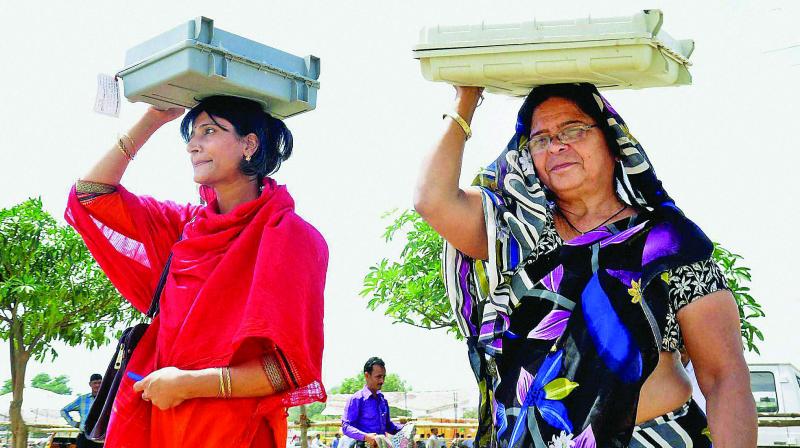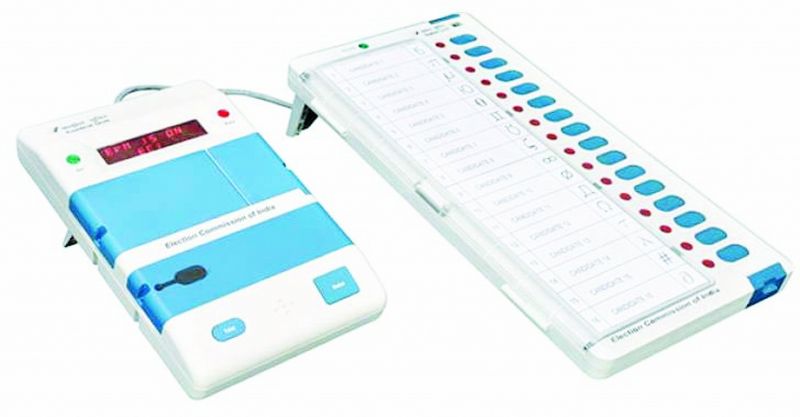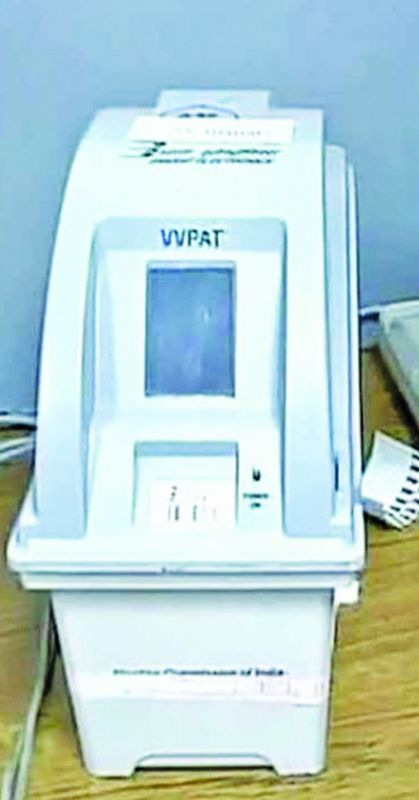Safe to press

In what was probably the shortest period for a Chief Election Commissioner to conduct a national election, I announced elections in end February 2004 after I had been appointed in early Feb. The first decision we had to take was on the machines – Electronic Voting Machines. We took a bold decision to use them in all constituencies and contacted the manufacturers. A few months in advance we had informed them on the likely number of machines we would need — a stock of 10 lakh machines. We had about 8 lakhs in hand and needed a standby of 2 lakhs. For some states like Andhra and Orissa, where we held simultaneous elections, we needed more machines. The government was never hesitant about allotting money.
There was a remarkably warm reception for the machines. People wanted to use them. I have always been saying the machines are credible, robust and reliable. The EVM is a simple machine. An American had written that it is a blend of a calculator and a Casio musical instrument because of the placement of the buttons. There is a story that an American sent a ball pen to space and it did not work but when a Russian sent a pencil, it worked. When someone tried a sophisticated machine, it did not work but when India tried something simple, it worked. Its cost was around Rs 300-400 (of one EVM). The credit goes to the engineers of Electronic Corporation of India, and Bharat Electronics.
The famous Tamil writer Sujatha was also associated with the EVM as one of the engineers. The machine was not immediately introduced because there is always apprehension associated with it. It started during Seshan’s period. Then it was referred to a committee of engineers in DRDO. Then another Committee headed by Dr Indiresan of IIT. And they produced a report saying they were absolutely trustworthy. In fact, I met Dr Indiresan before taking the decision to introduce the machine everywhere. I asked, “Sir, are you sure we will not get into trouble?” He said, “No. I had asked 40 electronic engineers to break open the machines and find a loophole. None of them could find one. So, I have no hesitation in saying they are absolutely trustworthy. Indiresan and the committee told me this and we went ahead and took a bold decision to use only EVMs.

When the results were announced, Prannoy Roy interviewed me at my home at 8 O’clock and asked me – “Are you nervous?” I asked, “Why, I am not contesting the elections.” I am not interested in any particular party. As far as the machines are concerned, they have been certified, experimented, and trusted. They were even questioned in the court and nothing happened. So, I knew, barring some unforeseen incidents, the machine will deliver. They did deliver. Hardly 0.01% of the machines, according to the voters, did not work. The machines don’t lie.
There are so many safeguards in the machine. One of the safeguards is that in each booth, before starting the elections, the machine is tested in the presence of the party agents. The biggest advantage of the machine is that you save a lot of paper. I heard that more than 200,000-300,000 reams of paper used to be used in the elections. The EVM is environment friendly, quick casting of votes and there are no invalid votes.
I have been asked what with the current technology with which they are able to break in and hack into anything and I replied that the EVM is only a calculator. It will not respond to a remote control. I know political parties, including BJP questioned this. I was among the very few at that time to boldly say that the machines are not to be questioned. We had a big campaign throughout the country — on bullock carts, in street corners, in schools and colleges and villages. I agree there must have been some apprehension. But we launched a huge campaign and our officers did a good job. The results were excellent. The EVM had come to stay.
I was the CEC when I got a call from a politician, saying the machine was giving wrong results. I noted it down and said I would call back in 10 minutes. I called my CEO and said please order an immediate enquiry. If the machine is doing it, segregate it, replace with a new machine. I want this machine to be sent to Delhi. We will verify what the problem is. It was found that the machine was not at fault. Machines are reliable. The Election Commission has brought out a nice booklet on the EVM and how we developed it. In my opinion, it should reach every media, every MP. It is also available on the website and it removes many of the apprehensions of the people.
The principal safety is the EVM cannot be hacked. One of the important ingredients is that it has a chip and they started criticising the chip brought from Japan, whether it can be tutored. The chip that is put in the machine is burnt as soon as it is programmed as a calculator. It cannot be reused. Within the machine, we have built a number of safeguards. Nobody can do anything unless you break open the machine, remove the old chip, put in a new chip and things like that. But for that too, we have so many safeguards. One of the things we ensured is that the machine is not kept in one state forever. The machine is shifted before every election. The names of the candidates are stuck on the basis of alphabetical order. In one constituency, one party may be on top and in another constituency, the same party may be at the bottom. These are things that can be explained to a logical mind. Still some people questioned it and the issue went to the Supreme Court.
Jayalalithaa and Amarinder Singh kept complaining. The Supreme Court said please prove the EVM can be doctored or tutored. The Election Commission said we will hand over the machine for examination and they said they had their own machine built on the same pattern. What are the safeguards in those machines, we asked. Their cases were dismissed and both of them got elected in the next elections. Then they didn’t open their mouths. Amarinder went on to say, “Excellent. I now believe.”
 VVPAT
VVPAT
They wanted VVPAT (Voter Verifiable Paper Audit Trail). When you vote, a slip comes in an adjacent unit and the machine shows whom you have voted for. This satisfies the voter, but in my opinion, it is a dangerous thing. Some people say, I voted for X but Y has come. Who is to be believed unless you have a CCTV. But with a CCTV the secrecy of the ballot is lost.
If they are going to tally the machine count with the VVPAT, then how much time will it take to cover 1 million polling stations? Why are we complicating the system? If we have anything to suggest to improve the system, please do. They have introduced VVPAT and still some parties will have complaints. The machines are absolutely trustworthy. They cannot be tutored or doctored by any external source because it is not like a computer which can be accessed remotely. It is not an electronic instrument, it is just an instrument doing calculations. And in every polling station, the list is in a different order. It can never be hacked.
In America, this was introduced and then withdrawn. The machines were made by a private company which had made huge donations to the then ruling party. So, they abandoned it. But some states still have touchscreens and machines. Every state has a different system as America is a confederation. Initially, they were sovereign powers and then they came together. They have a Supreme Court. They have a separate election commission in each state and they follow their own rules. In fact, American parliamentarians came and had a look at our machines and they were quite satisfied. The Pakistan Prime Minister whom I met at that time when I went to Pakistan, said, “Please see if it can be introduced in Pakistan.” They were interested. He was an economist at that time, not a politician. Imran Khan was also there in a meeting when they had a workshop on conducting elections.
LALU TACTICS
I countermanded the elections where Lalu Prasad was contesting in Bihar. We had a lot of complaints that there was booth rigging — after 3 or 4 pm no one would be allowed to vote. I sent TJ Rao to the constituency to find out the truth. “Sir I am going to open the strong room where all documents are kept. Will you give me the authority? I said “Yes go and see, but don’t do it alone, take two or three persons, there must be witnesses.”
In Bihar, when we conducted elections, there were 500 police stations which did not have telephones. I called the BSNL chief and told him I want you to provide telephones in all the police stations. We will pay for it. We will get it reimbursed from the state government. All 500 police stations were provided with telephones. They also wanted me to give permission for helicopters to fly as it is not possible to go to some laces in Bihar even in 3 to 4 hours by road.
In the Bihar assembly elections in 2005, nobody got a majority for the first time. Mr Lalu Prasad Yadav wanted a member of the minority community to be the Chief Minister, but this is the last thing he would really have wished for. What is curious is that the Supreme Court disbanded the House. They said for one year nobody could be the CM. They kept it in suspended animation. But in my opinion, the Supreme Court does not have the authority to suspend or dissolve the House. It was a judicial error. They should have said - see to it that the process is initiated. The Governor should have dissolved the House, not the Supreme Court.
MONEY, ALCOHOL
There were some states which were really earmarked as unruly in terms of distribution of money and alcohol. Punjab, Bihar, maybe UP and some small places. Not significant money distribution but there were complaints but not in the manner of Thirumangalam where it is said they put money in brown paper, inside a newspaper. It was never that bad at that time. Bribing voters with liquor was very common though in Punjab and Haryana.
BIG FIGHT
I had a big fight with Mr Chauthala once, now of course he is behind the bars. His Chief Secretary used to come to me and report what was happening. The Haryana DGP’s wife was contesting the elections. The newspapers flashed it when I was in Chandigarh and the press asked me how I was going to deal with it. The next day I called the Chief Secretary and he told me the CM is not accepting and that he criticised me personally – he asked who is this CEC asking me about the DGP? Party people were coming and going freely to the DGP Malik’s home. I said please tell your CM if he is not going to send this DGP on leave I will cancel the elections. You can tell him. The next day the DGP went on leave.
HALCYON DAYS
When the first election was held in 1952, Mr Sen Varma was the first single Chief Election Commissioner. He did a wonderful job because for the first time in the history of India, all the voters were enumerated. The elections were held over about a period of two and a half months’ time from November through to January. Many critics had said that the elections were bound to be a failure, an experiment in futility, and that we would not be able to conduct elections of such a vast nation. At that time, there was a ballot box for each candidate, irrespective of his party or independent. Every candidate had one and we had to put the vote in the box concerned. It was indeed a festival of democracy, probably because there were not too many parties. Congress was dominating and the results were announced and accepted, and not contested. Maybe a few fellows contested in the High Court with Writ Petitions. But the people enjoyed going to vote. People were invited. Some of them were taken in cars by the candidate. But there was no talk of corruption.
Till 1967, it was simultaneous voting, both for the States and the Centre. The problem started after 1967, it may have been 1969 when Haryana started with “Aaya Ram, Gaya Ram” and en masse defections, and the yields of democracy started during that period. It started spreading everywhere and the rulers thereafter were also dismissing governments. I won’t say on whims and fancies but for their own needs. Political parties and their political arrangements increased. People found politics is a very lucrative game and they could make a lot of money changing parties, contesting the elections, becoming a minister.
EMERGENCY
People said the 1975 Emergency was an aberration. I too thought so. But the Emergency was not just an aberration. It deteriorated our political democracy. Not only one party, all the parties became absolutely authoritarian. There was a famous judgement made by Chief Justice Sabyasachi Mukherjee. In one case, he said, “Out of respect for the tribunal, I would not say it was careless; however, the judgement was carefree.” That is Indian politics.
THREATS
As poll officials, we used to get plenty of threats, particularly in Tamil Nadu and Mumbai. They would all say they would finish the family (of officials). There were anonymous letters aplenty. I told my wife who was spending some time in Chennai not to go out alone and that God will take care of us.
(Taruvai Subayya Krishnamurthy is a former IRS officer who served as 13th Chief Election Commissioner of India in 2004 - 2005. e had served in ECI as Commissioner from January 2000)

